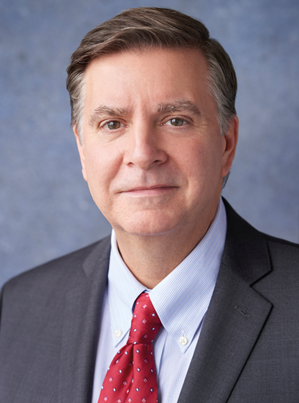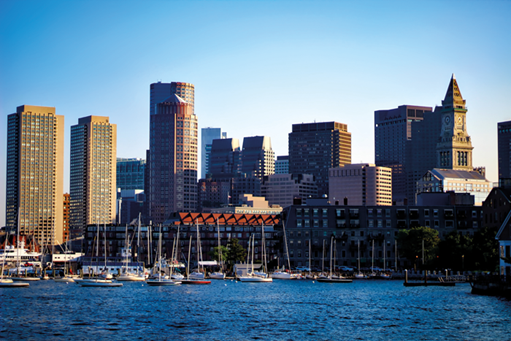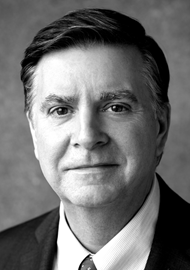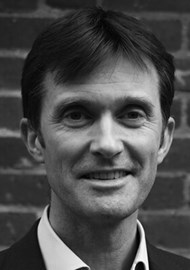The American Academy of Otolaryngology – Head and Neck Surgery (AAO-HNS) is the world’s largest otolaryngology, head and neck surgical organisation. Declan Costello caught up with its new President, Dr Gregory W. Randolph.

Dr Gregory W. Randolph.
Congratulations on your appointment as President of the AAO-HNS. Can you tell us how the appointment to this post is made?
Otolaryngology head neck surgery has been my field basically since I was a third-year medical student at Cornell Medical College. It is one of the greatest honours in my career to assume the presidency of the American Academy. As you know, this is an organisation of over 11,000 otolaryngologists in America and Canada and also has 1000 international members. It is really a global organisation with over 60 international corresponding societies; those are national otolaryngologic societies which have a defined relationship with our American Academy.
I have been active within our American Academy for many years, starting initially as member and then Chairman of the Endocrine Surgical Committee. Subsequent to that, I spent six years as International Coordinator for the Academy heading all international and humanitarian efforts. As International Coordinator, I also served on the Board of Directors. The Academy staff – and especially the chief executive officer, Dr James Denneny – are some of the most talented individuals I’ve ever worked with and I’m proud to stand by their side as the Academy moves forward into the future.
The way the president is selected is a nominating committee looks at the pool of candidates that have demonstrated commitment to the Academy, and then two candidates are selected. The candidates present themselves to the Academy membership and then there is a national vote. This is the process through which I was selected.
What are the main challenges with running an organisation as big as the AAO-HNS?
First of all, the president is just one part of a very large organisation with over 70 staff members and with many, many physician volunteers. There is a board of directors and a chief executive officer who do the bulk of the administration and orchestration of the activities of the academy. This organisation has many different areas of activity including education, research and advocacy. As President-elect, I was tasked with committee appointments. This is a very significant endeavour given that the Academy has over 70 committees with over 1500 volunteer members. I was able to move forward my agenda of diversity as I made these committee appointments.
I would say one of the main challenges is, on one hand, maintaining the administrative activities that are so important for the ongoing day-to-day activities of the Academy but also blending with these your personal goals or wishes for change that one desires to bring to the organisation; the ideas that are somewhat out-of-the-box in terms of day-to-day organisational administrative activities. I think it is our responsibility to be true to bringing positive change to our field and to our Academy.
Who are the AAO-HNS’s ‘International Guests of Honour’ for 2017?
Now, 35% of the attendees at the Academy meeting are from overseas, so the meeting has really become the de facto international meeting, in spite of the name, ‘American’. Our international relationships were initiated by Drs Eugene Myers and KJ Lee. We have very deep ties with international otolaryngology societies, and have recently formed an International Advisory Board. Our international collaborators are very firmly embedded in the fabric of the AAO-HNS through this International Advisory Board, so you could argue that our annual meeting is really the pre-eminent international otolaryngology meeting. I’m very excited about four countries we have invited as ‘International Guests of Honour’; they include China, France, Mexico and South Korea. The Academy has had significant interactions with all of these countries but the potential for growth of collaborative opportunities with each of these countries is immense.
Mexico and South Korea have been long-term partners with the American Academy: we plan to maintain and expand these relationships. Chinese otolaryngologists have had a previous experience with our Academy as a guest country. I plan a trip to China in March to engage these leaders and their members and personally invite them participate in the collaborative and evolving relationship with our American Academy and to visit our annual meeting in Chicago, September 2017. We are working hard with French otolaryngologic leadership in the conduct of their International Federation of Otolaryngologic Societies (IFOS) meeting in June 2017.
If you had to give a one-minute ‘pitch’ for the AAO-HNS annual meeting, what would you say?
Very simply, the AAO-HNS annual meeting is regarded around the globe as the highest quality otolaryngology meeting on the face of this planet. Simply come and you will be amazed at the depth of the programming – keynote presentations, welcoming opening ceremony and instructional course programme – that is second to none, as well as mini symposiums drawn from many of our committees on every topic imaginable by renowned experts in the field. This year will be our inaugural International Advisory Board, which is a gathering of otolaryngologists from around the world. You will not be disappointed: you will be amazed and overwhelmed. The annual meeting of the American Academy of Otolaryngology is set for 10-13 September 2017 Chicago, a city of rich heritage and cultural opportunities.
How do you achieve a balance between your clinical work and your work for the Academy?
I would say I’m still in the process of working towards a balance between clinical and Academy work. Fortunately, I love the Academy and I also love thyroid and parathyroid endocrine surgery and so I really don’t see this as a problem. My wife Lorraine helps me tremendously, orchestrating my travel in a way that allows me to do more. One must be efficient and have great assistance – as I do – to coordinate all of the various activities this year. We are all only here once and I wish to make the most of it.
Looking back to the early years of your career, who were your greatest influences?
As a third-year Cornell medical student, I did a rotation at Memorial Sloan-Kettering, and there I met Dr Roy Sessions the first otolaryngologist on the renowned head neck service of Memorial, and also Jatin Shah and Elliott Strong. These individuals were formative in my decision-making to stay within the field of head neck surgery and specifically focus on thyroid surgery.
And looking at the next generation of surgeons, what advice do you give them?
I did extensive reading early on in my career and I was fortunate to be able to identify certain leaders in the field through this reading and then approach them at meetings, where I would hear their lectures. I would really encourage all young surgeons to identify individuals through their literature contributions and then seek out these individuals. We should not be afraid to do that; go up and tap them on the shoulder. The response that I got from these leaders when I would approach them at meetings was tremendously warm and positive and motivated me to strive forward in the field of endocrine surgery.
The second piece of advice I would give would be to strive towards perfection in your surgical care of patients. There will always be issues, problems and complications, of course. Our commitment when these things occur is to learn optimally from them. But one must always strive towards perfection: this is our commitment to our patients and this is our commitment to ourselves.
Looking back over the years, is there anything you might have done differently?
Well, the balance of family and work is always a difficult one to achieve, and I find it difficult to advise in this area! The analogy might be with a car: in your early career, you are in a low gear, and perhaps have young children, hence you spend time at home. But as you work through the gears / years, children tend not to need you at home so much, so weekends in the office are a bit better tolerated. For me as a child growing up, my family background was troubled by addiction; my own particular addiction has been to work and to improve the care of patients with head, neck and thyroid disease, so I would say there are worse things to be addicted to!
The US is obviously about to undergo a period of great change, politically and perhaps socially as well. How do you see the healthcare system changing under the Trump administration?
It looks like Affordable Care Act may be, at the very least, significantly modified in the upcoming years. It is difficult, I think, for anyone to make clear-cut predictions, given all of this instability. I think the message I would give to young surgeons is be involved in this process. The Academy provides a wonderful vehicle for legislative and advocacy work. If we are not involved actively and leading this process we are enslaved by it. We must act as a uniform body within the Academy.
The picturesque Boston where the World Congress on Thyroid Cancer will be held in July 2017.
You live in one of America’s most picturesque cities – do you get much of a chance to enjoy it?
Boston is an amazing city; picturesque, educated, elegant, beautifully situated on the Atlantic with the wonderful Charles river running through it. The colleges and the medical institutions are second to none, I feel. One of our favourite things to do is to travel from Boston to Cape Cod and enjoy the seashore there with my family: my children, Greg Jr, Benjamin Frank, Madeline Francis and my wife, Lorraine. I love to travel to the Cape, not only in the summer, but also fall and winter. I also enjoy Boston because of where I work: the Massachusetts Eye and Ear Infirmary and the Harvard Department of Otolaryngology, chaired by my good friend and mentor Dr Brad Welling. I feel this is best place in the world to work and the best job in the world. The department as you know has been rated number one in the news and World Report over the last several years.
I did want to also mention one additional upcoming Boston attraction, the World Congress on Thyroid Cancer – a unique collaborative multidisciplinary Congress which will be held for the third time in Boston on 27-30 July 2017. This is the largest thyroid cancer meeting on the planet and will have over 1000 attendees from surgery, endocrinology, pathology and oncology. It’s a great opportunity to come and visit Boston in July.
Interviewed by Declan Costello.
Declaration of competing interests: None declared.






